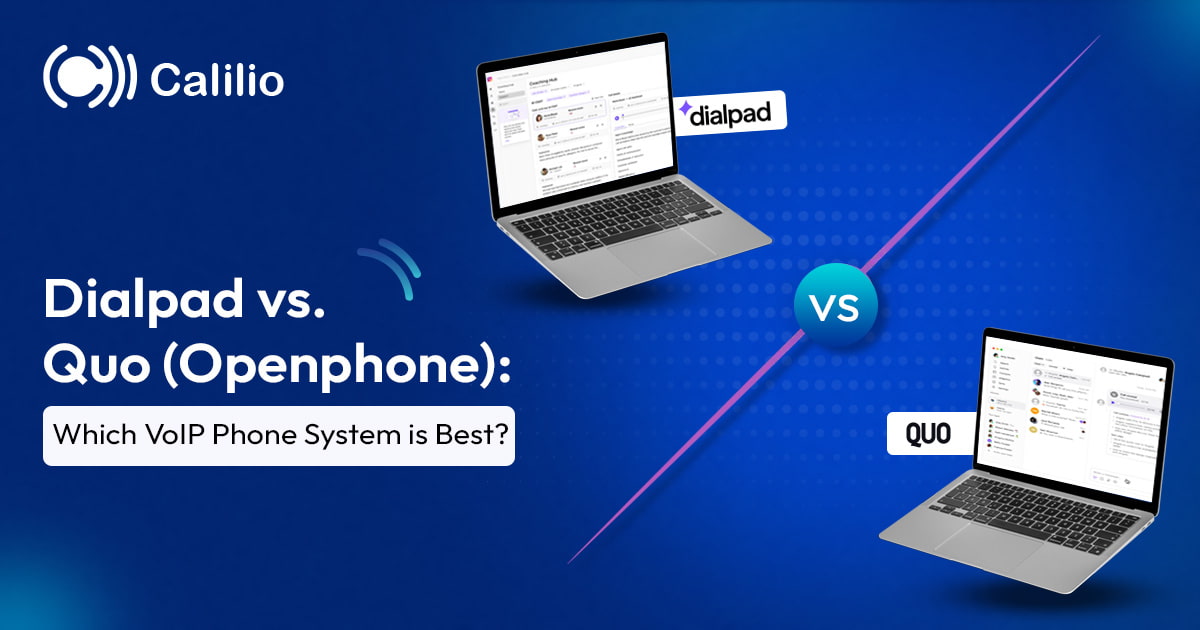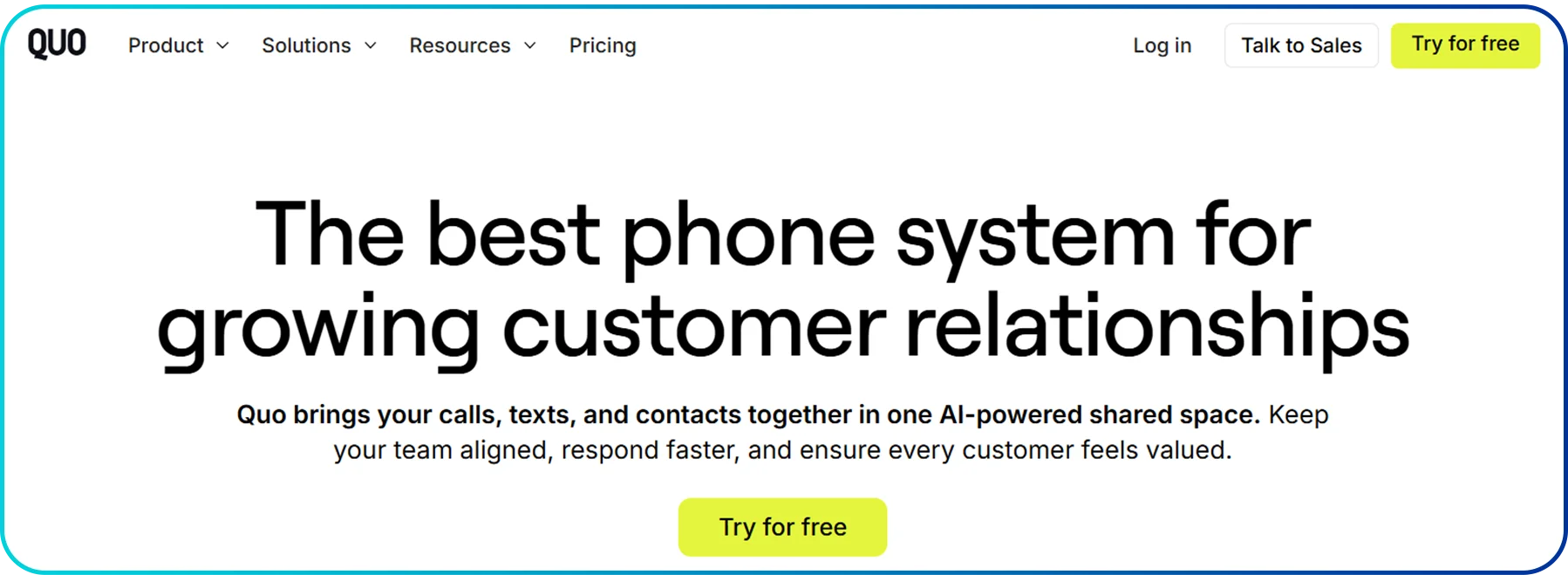Dialpad vs. Quo (Openphone): Which Solution is Right for Your Business?

As traditional phone systems become outdated, Voice over Internet Protocol (VoIP) has emerged as the go-to solution, providing cost savings and flexibility for remote teams.
And when it comes to VoIP providers for small businesses and growing teams, two names often stand out: Dialpad and Quo. Both platforms offer cloud-based communication, but they cater to different users and excel in different areas.
In this article, we’ll compare Dialpad vs. Quo (Openphone), explore their key features, differences, strengths, and weaknesses to help you make the right choice for your business.
Key Highlights:
Dialpad offers AI-powered features like real-time transcription, sentiment analysis, and call summaries, making it ideal for larger businesses with complex communication needs.
Quo focuses on simplicity and ease of use, providing an intuitive interface perfect for small businesses and startups looking for an affordable, straightforward VoIP solution.
Dialpad is better suited for larger teams needing robust features, integrations, and enterprise-grade solutions, while OpenPhone is perfect for small teams focused on simplicity and scalability.
Calilio provides a better alternative to Dialpad and Quo with its ease of use and affordability, while including advanced telephony features.
Dialpad Overview
Dialpad is an AI-powered, cloud-based UCaaS solution that provides businesses with a single application for all their communications needs. Serving over 7K brands and millions of users, it has established itself as a top choice for modern business communication. The platform centers on its proprietary Voice Intelligence (VI) technology, which delivers real-time transcription and analytics. Key Features:
Key Features:
- DialpadGPT
- Video Conferencing
- IVR Systems
- Post-call Automation
- QA Scorecard
Pros | Cons |
|
|
Quo (OpenPhone) Overview
Quo, formerly known as OpenPhone, is a VoIP phone system designed specifically for small businesses and growing teams. It offers an affordable phone system with a simple user interface that includes vast team collaboration tools such as shared inboxes, shared numbers, and internal threads. Quo focuses on empowering small businesses, providing them with the professional communication tools needed to grow and succeed. Till now, over 60,000 businesses have used Quo, making more than 1 billion calls.
Quo focuses on empowering small businesses, providing them with the professional communication tools needed to grow and succeed. Till now, over 60,000 businesses have used Quo, making more than 1 billion calls.
Key Features:
- Call Transcriptions
- AI Text Messages
- Automatic Call Routing
- Call Forwarding
- Business SMS and MMS
Pros | Cons |
|
|
Quo vs. Dialpad: How Do They Differ?
The major difference between Dialpad and Quo lies in their target audience and feature sets. They also differ in several key areas, including pricing, integrations, call quality, and customer support.
1. Pricing
Quo offers flexible and comparatively lower pricing plans for small businesses, starting at $19/user/month, with higher-tier plans available as the business grows. On the other hand, Dialpad provides an enterprise-focused solution, starting at $27/user/month for the Standard plan and custom pricing for the Enterprise plan.
Quo | Dialpad |
Starter: $19/user/month | Standard: $27/user/month |
Business: $33/user/month | Pro: $35/user/month |
Scale: $47/user/month | Enterprise Plan: Custom Pricing |
2. Features
Dialpad offers a broader range of features for larger organizations, including AI-powered voice agents, sentiment analysis, and a Power Dialer for outbound sales. Quo is more focused on simplicity and ease of use, with key features like shared inboxes and scheduling SMS/MMS.
Feature | Dialpad | Quo (OpenPhone) |
Shared Phone Numbers/Inboxes | ✔ | ✔ |
IVR/Auto-Attendant | ✔ | ✔ |
Call Forwarding & Simultaneous Ring | ✔ | ✔ |
Voicemail-to-Text Transcription | ✔ | ✔ |
Automatic Call Recording | ✔ | ✔ |
Three-way Calling/Group Calling | ✔ | ✔ |
Real-time Call Transcription | ✔ | ✔ |
AI-Generated Call Summaries/Recaps | ✔ | ✔ |
Call Sentiment Analysis | ✔ | ❌ |
AI Voice Agent | ✔ | ❌ |
Power Dialer/Sales Dialer | ✔ | ❌ |
CRM Integrations | ✔ | ✔ |
Internal Team Messaging/Threads | ✔ | ✔ |
Scheduling SMS/MMS | ❌ | ✔ |
3. Integrations
Dialpad supports a wider range of integrations, including advanced tools for enterprise-level CRMs like Microsoft Dynamics 365, Zendesk, and Pipedrive. Quo focuses more on essential integrations for small businesses, providing integration with tools like Slack, Shopify, and Google Workspace.
Tool | Dialpad Support | Quo Support |
Salesforce, HubSpot | ✔ | ✔ |
Microsoft Dynamics 365 | ✔ | ❌ |
Zoho CRM | ✔ | ✔ |
Zendesk | ✔ | ❌ |
Pipedrive | ✔ | ✔ |
Jobber | ❌ | ✔ |
Slack | ✔ | ✔ |
Microsoft Teams | ✔ | ❌ |
Google Workspace | ✔ | ✔ |
Shopify | ✔ | ✔ |
Gong | ❌ | ✔ |
Zapier | ✔ | ✔ |
Intercom | ✔ | ❌ |
4. User Reviews
While Dialpad has a slightly lower rating on G2 compared to Quo, it still has excellent ratings on Capterra, Trustpilot, and App Store. Similarly, Quo has consistently received high ratings, especially from small businesses, for its ease of use and simplicity.
Review Platform | Dialpad | Quo |
G2 | ★★★★☆ (4.4/5) | ★★★★★ (4.7/5) |
Capterra | ★★★★☆ (4.4/5) | ★★★★☆ (4.2/5) |
Trustpilot | ★★★★☆ (4.2/5) | ★★★★☆ (4.0/5) |
Apple App Store (iOS) | ★★★★★ (4.6/5) | ★★★★★ (4.5/5) |
Google Play Store (Android) | ★★★★★ (4.6/5) | ★★★★★ (4.6/5) |
5. Call Quality
Dialpad is a more robust platform, built for enterprises with a focus on high-definition (HD) audio. It uses advanced technologies like the OPUS codec, ensuring clear calls even on weak networks.
Quo, designed for small businesses and startups, also provides good call quality but depends heavily on the user’s internet connection. While it performs well overall, users sometimes experience call clarity issues that may require restarting the app.
6. Customer Support
Dialpad offers a wide range of support channels, including 24/7 chat support and phone support for higher-tier users. However, user satisfaction is mixed, with some complaints about billing issues and delayed resolutions, despite positive feedback on responsiveness.
Quo focuses on chat and email support, available during business hours. While its support options are more limited, users generally report high satisfaction with the support team for offering quick resolutions for any issues.
Here’s a table highlighting the key differences between Quo and Dialpad:
Factors | Quo (OpenPhone) | Dialpad |
Pricing | Comparatively lower price | Expensive pricing |
Free Trial | 7 days | 14 days |
Availability | Primarily, the US and Canada | Global Presence |
Key Features |
|
|
Integrations | Slack, Zapier, Make, Google Contacts, HubSpot, and Salesforce | Google Workspace/Microsoft 365, Salesforce, Zendesk, HubSpot, and Okta |
Customer Support | Email Ticket Support, Live Chat Support, and Priority Live Chat | Email and Online Support, 24/7 Phone and Chat Support |
Target Audience | Primarily focused on small businesses and startups | Small businesses to larger enterprises |
Mobile and Web App | Yes | Yes |
User Reviews | G2: 4.4 ★ Play Store: 4.6 ★ Capterra: 4.2 ★ | G2: 4.7★ Play Store: 4.6 ★ Capterra: 4.4 ★ |
Methodology: To compare Dialpad and Quo, we focused on key factors such as pricing, features, integrations, and target audience. We examined call quality, customer support options, and user reviews from platforms like G2 and Trustpilot to assess reliability and satisfaction.
Dialpad vs. Quo: Which is the Best Fit for Your Business
If you're looking for a comprehensive communication system with advanced features, integrations, and AI-powered tools, Dialpad is the better fit. However, if you need an easy-to-use, affordable solution for small businesses or startups, Quo is likely to be your best choice.
Here’s a quick breakdown to help you choose:
Pick Dialpad If:
- You need a robust, enterprise-grade phone system with AI-powered features like real-time transcription and call analytics.
- You require integrations with major CRMs, such as Salesforce, HubSpot, and Microsoft Dynamics 365.
- You need a unified communications platform that includes voice, video, messaging, and call center solutions.
- You want 24/7 customer support and advanced technical assistance.
- Your business needs high-quality call performance and scalability for growing teams.
Pick Quo If:
- You need a simple, cost-effective phone system for small businesses or startups.
- You prefer a user-friendly interface with easy setup and basic features like voicemail-to-text and shared inboxes.
- You need reliable communication tools for SMS/MMS, group texting, and scheduling messages.
- You want a low-cost solution with no complex setup or monthly contracts.
- You need a platform that integrates well with popular CRMs like HubSpot and Pipedrive but doesn’t require advanced features.
Simplify Cloud Communication with a Powerful, Affordable Alternative to Dialpad and Quo.
Calilio: Best Alternative to Dialpad & Quo
While Dialpad and Quo are well-established in the VoIP industry, Calilio stands out as the best alternative with its feature-rich offerings, exceptional call quality, and affordability. Designed with an intuitive and user-friendly interface, Calilio is accessible to users without technical expertise.
Moreover, Calilio provides businesses with a range of advanced features to enhance communication and improve operational efficiency. Key features include AI-powered Call Reporting, which delivers detailed insights after each call, including transcriptions, summaries, and the reason for the call, helping teams understand customer interactions better.
What truly sets Calilio apart from Dialpad and Quo is its affordability and transparency. Unlike Dialpad and Quo, Calilio offers competitive pricing, with the standard plan starting at just $15 per user per month.
Summarize this blog with:
Frequently Asked Questions
Is Dialpad the same as Quo?
No, Dialpad and Quo are not the same. Dialpad is an enterprise-grade VoIP platform, designed for medium to large businesses. Quo, on the other hand, is a simpler, more affordable VoIP solution designed for small businesses and startups, focusing on ease of use.
Do Dialpad and Quo provide free services?
Is Dialpad better than Quo?

Still have questions?
Can’t find the answer you’re looking for? Please chat with our friendly team.
Stay in the loop
Get the latest call insights, trends, and updates delivered straight to your inbox.
By subscribing, you agree to receive updates from Calilio.
You can unsubscribe anytime.
